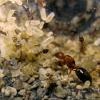I know, there must be something non genetic about whether queens are productive or not. How certain foods could affect the development of female alate larvae.
- Formiculture.com
- Forums
- Gallery
- Members
- Member Map
- Chat

I know, there must be something non genetic about whether queens are productive or not. How certain foods could affect the development of female alate larvae.
Check out my Youtube Channel! https://www.youtube....xh-HaScAuE5CShQ
Check out my Crematogaster Journal! https://www.formicul...e-2#entry141180
Also I am going to try to breed Pheidole, Trachymyrmex, and a lot of other species
Also I am going to try to breed Pheidole, Trachymyrmex, and a lot of other species
You can't breed Pheidole in captivity as they mate in the air like Camponotus.
Currently Keeping:
Camponotus chromaiodes, Camponotus nearcticus, Stigmatomma pallipes, Strumigenys brevisetosa, Strumigenys clypeata, Strumigenys louisianae, Strumigenys membranifera, Strumigenys reflexa, Strumigenys rostrata
most ants mate in the air, the only exceptions are army ants and some other ants.
There is a important time for everything, important place for everyone, an important person for everybody, and an important ant for each and every ant keeper and myrmecologist alike
"God made..... all the creatures that move along the ground according to their kinds (including ants). And God saw that it was good. Genesis 1:25 NIV version
Keeping:
Tetramorium immigrans Camponotus vicinus, modoc, novaeboracensis, herculeanus
Formica pallidefulva, argentea Solenopsis molesta
Formica cf. aserva Lasius brevicornis, neoniger
0 members, 1 guests, 0 anonymous users